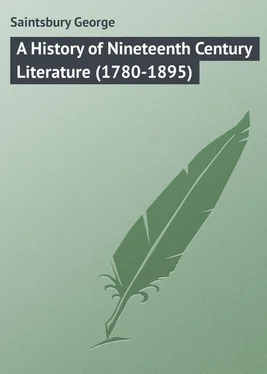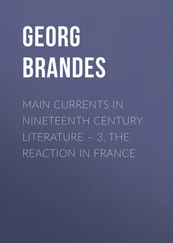George Saintsbury - A History of Nineteenth Century Literature (1780-1895)
Здесь есть возможность читать онлайн «George Saintsbury - A History of Nineteenth Century Literature (1780-1895)» — ознакомительный отрывок электронной книги совершенно бесплатно, а после прочтения отрывка купить полную версию. В некоторых случаях можно слушать аудио, скачать через торрент в формате fb2 и присутствует краткое содержание. ISBN: , Жанр: foreign_prose, на английском языке. Описание произведения, (предисловие) а так же отзывы посетителей доступны на портале библиотеки ЛибКат.
- Название:A History of Nineteenth Century Literature (1780-1895)
- Автор:
- Жанр:
- Год:неизвестен
- ISBN:http://www.gutenberg.org/ebooks/31698
- Рейтинг книги:5 / 5. Голосов: 1
-
Избранное:Добавить в избранное
- Отзывы:
-
Ваша оценка:
- 100
- 1
- 2
- 3
- 4
- 5
A History of Nineteenth Century Literature (1780-1895): краткое содержание, описание и аннотация
Предлагаем к чтению аннотацию, описание, краткое содержание или предисловие (зависит от того, что написал сам автор книги «A History of Nineteenth Century Literature (1780-1895)»). Если вы не нашли необходимую информацию о книге — напишите в комментариях, мы постараемся отыскать её.
A History of Nineteenth Century Literature (1780-1895) — читать онлайн ознакомительный отрывок
Ниже представлен текст книги, разбитый по страницам. Система сохранения места последней прочитанной страницы, позволяет с удобством читать онлайн бесплатно книгу «A History of Nineteenth Century Literature (1780-1895)», без необходимости каждый раз заново искать на чём Вы остановились. Поставьте закладку, и сможете в любой момент перейти на страницу, на которой закончили чтение.
Интервал:
Закладка:
Giving poetry, as usual, the precedence even in the most unpoetical periods, we shall find in the four names already cited – those of Crabbe, Cowper, Blake, and Burns – examples of which even the most poetical period need not be ashamed. In what may be called the absolute spirit of poetry, the nescio quid which makes the greatest poets, no one has ever surpassed Burns and Blake at their best; though the perfection of Burns is limited in kind, and the perfection of Blake still more limited in duration and sustained force. Cowper would have been a great poet of the second class at any time, and in some times might have attained the first. As for Crabbe, he very seldom has the absolute spirit of poetry just mentioned; but the vigour and the distinction of his verse, as well as his wonderful faculty of observation in rendering scene and character, are undeniable. And it is not perhaps childish to point out that there is something odd and out of the way about the poetical career of all these poets of the transition. Cowper's terrible malady postpones his first efforts in song to an age when most poets are losing their voices; Crabbe, beginning brilliantly and popularly, relapses into a silence of nearly a quarter of a century before breaking out with greater power and skill than ever; Burns runs one of the shortest, if one of the most brilliant, Blake one of the longest, the strangest, the most intermittent, of poetical careers. Nor is it superfluous to draw attention further to the fact that when we leave this little company – at the best august, at the worst more than respectable – we drop suddenly to the flattest and most hopeless bog of poesiless verse that lies anywhere on the map of England's literature. Passing from the ethereal music of the Scottish ploughman and the English painter, from Cowper's noble or gentle thought and his accomplished versification, from Crabbe's manly vigour and his Rembrandt touch, we find nothing, unless it be the ingenious but not strictly poetical burlesque of the Wolcots and the Lawrences, till we come to the drivel of Hayley and the drought of Darwin.
Of the quartette, William Cowper was by far the oldest; the other three being contemporaries within a few years. He was born on 26th November 1731 at Great Berkhampstead. His father was a clergyman and a royal chaplain, his mother one of the Norfolk Donnes. Her early death, and that school discomfort which afterwards found vent in Tirocinium , appear to have aggravated a natural melancholia; though after leaving Westminster, and during his normal studies at both branches of the law, he seems to have been cheerful enough. How what should have been the making of his fortune, – his appointment as Clerk of the Journals to the House of Lords, – not unassisted by religious mania, drove him through sheer nervousness to attempt suicide, is one of the best known things in English literary biography, as indeed are most of the few events of his sad life, – owing partly to his own charming letters, partly to the biographies of Southey and others. His latest days were his unhappiest, and after years of more or less complete loss of reason he died on 27th April 1800.
It has been said that Cowper did not take to writing till late in life. He had had literary friends – Churchill, Lloyd, and others – in youth, and must always have had literary sympathies; but it was not till he was nearly fifty, nor till the greater part of twenty years after his first mental seizure, that he attempted composition at the instance of his friend Newton and the Unwins. Beginning with hymns and trifles, he before long undertook, at this or that person's suggestion, longer poems, such as Truth , The Progress of Error , and Expostulation , which were finished by 1781 and published next year, to be followed by the still better and more famous Task , suggested to him by Lady Austen. This appeared in 1785, and was very popular. He had already begun to translate Homer, which occupied him for the greater part of seven years. Nothing perhaps settled him more in the public affections than "John Gilpin," the subject of which he also owed to Lady Austen; and he continued to write occasional pieces of exquisite accomplishment. Almost the last, if not actually the last, of these, written just before the final obscuration of his faculties, was the beautiful and terrible "Castaway," an avowed allegory of his own condition.
Cowper, even more than most writers, deserves and requites consideration under the double aspect of matter and form. In both he did much to alter the generally accepted conditions of English poetry; and if his formal services have perhaps received less attention than they merit, his material achievements have never been denied. His disposition – in which, by a common enough contrast, the blackest and most hopeless melancholy was accompanied by the merriest and most playful humour – reflected itself unequally in his verse, the lighter side chiefly being exhibited. Except in "The Castaway," and a few – not many – of the hymns, Cowper is the very reverse of a gloomy poet. His amiability, however, could also pass into very strong moral indignation, and he endeavoured to give voice to this in a somewhat novel kind of satire, more serious and earnest than that of Pope, much less political and personal than that of Dryden, lighter and more restrained than that of the Elizabethans. His own unworldly disposition, together with the excessively retired life which he had led since early manhood, rather damaged the chances of Cowper as a satirist. We always feel that his censure wants actuality, that it is an exercise rather than an experience. His efforts in it, however, no doubt assisted, and were assisted by, that alteration of the fashionable Popian couplet which, after the example partly of Churchill and with a considerable return to Dryden, he attempted, made popular, and handed on to the next generation to dis-Pope yet further. This couplet, paralleled by a not wholly dissimilar refashioning of blank verse, in which, though not deserting Milton, he beat out for himself a scheme quite different from Thomson's, perhaps show at their best in the descriptive matter of The Task and similar poems. It was in these that Cowper chiefly displayed that faculty of "bringing back the eye to the object" and the object to the eye, in which he has been commonly and justly thought to be the great English restorer. Long before the end of the Elizabethan period, poetical observation of nature had ceased to be just; and, after substituting for justness the wildest eccentricities of conceit, it went for a long time into another extreme – that of copying and recopying certain academic conventionalities, instead of even attempting the natural model. It is not true, as Wordsworth and others have said, that Dryden himself could not draw from the life. He could and did; but his genius was not specially attracted to such drawing, his subjects did not usually call for it, and his readers did not want it. It is not true that Thomson could not "see"; nor is it true of all his contemporaries and immediate followers that they were blind. But the eighteenth century had slipped into a fault which was at least as fatal as that of the Idealist-Impressionists of the seventeenth, or as that of the Realist-Impressionists of our own time. The former neglected universality in their hunt after personal conceits; the latter neglect it in the endeavour to add nothing to rigidly elaborated personal sensation. The one kind outstrips nature; the other comes short of art. From Dryden to Cowper the fault was different from both of these. It neglected the personal impression and the attention to nature too much. It dared not present either without stewing them in a sauce of stock ideas, stock conventions, stock words and phrases, which equally missed the universal and the particular. Cowper and the other great men who were his contemporaries by publication if not by birth, set to work to cure this fault. Even the weakest of them could never have been guilty of such a passage as that famous one which Congreve (as clever a man as any) wrote, and which Johnson (as clever a man as any) admired. The sentiment which actuated them was, if we may trust Coleridge's account of Boyer or Bowyer, the famous tyrant of Christ's Hospital, well diffused. "'Nymph,' boy? You mean your nurse's daughter," puts in a somewhat brutal and narrow form the correction which the time needed, and which these four in their different ways applied.
Читать дальшеИнтервал:
Закладка:
Похожие книги на «A History of Nineteenth Century Literature (1780-1895)»
Представляем Вашему вниманию похожие книги на «A History of Nineteenth Century Literature (1780-1895)» списком для выбора. Мы отобрали схожую по названию и смыслу литературу в надежде предоставить читателям больше вариантов отыскать новые, интересные, ещё непрочитанные произведения.
Обсуждение, отзывы о книге «A History of Nineteenth Century Literature (1780-1895)» и просто собственные мнения читателей. Оставьте ваши комментарии, напишите, что Вы думаете о произведении, его смысле или главных героях. Укажите что конкретно понравилось, а что нет, и почему Вы так считаете.












